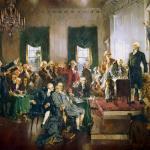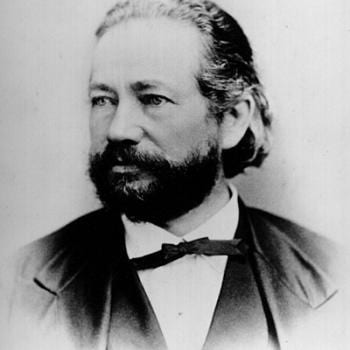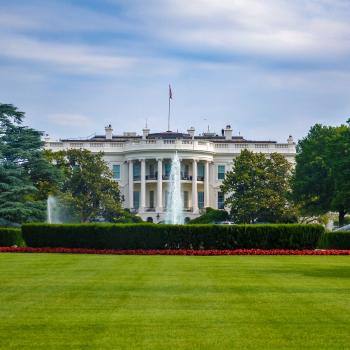
I’ve been reading Matthew Henry’s (1662-1714) commentary on Ecclesiastes to compliment the sermon series on the same at my church. A deep dive into the wisdom literature of the Old Testament has never been more necessary, nor more comforting. This doesn’t quite count as an election sermon (notes from which I’ve been posting over the past week) but its close.
Commenting on Ecclesiastes 1:9-11, Henry, channeling Solomon, disabuses us of self-confidence stemming from any false conceptions of the novelty of our own moment, or the endurance of our own inventions.
“How grateful is it to think that none ever made such advances in knowledge, and such discoveries by it, as we, that none ever made such improvements of an estate or trade, and had the art of enjoying the gains of it, as we have. Their contrivances and compositions are all despised and run down, and we boast of new fashions, new hypotheses, new methods, new expressions, which jostle out the old, and put them down. But this is all a mistake: The thing that is, and shall be, is the same with that which ahs been, and that which shall be done will be but the same with that which is done, for there is no new thing under the sun.”
I have had to preach this to myself over the past week as I (rightly, I think) lamented the state of our nation. I spent the better part of my childhood in what is considered (relatively speaking) a fairly stable democratic nation in west Africa. It has enjoyed several successful (i.e. coup-less) transitions of power since its independence in the early 1960s. Nevertheless, every election season, whatever the situation, was marked by unrest and (again, relatively) low-level violence and destruction of property. We stayed close to home in the weeks surrounding election day, and didn’t venture out at all on election day. But I still remember the burning tires in the streets; the overturned (also burning) cars blocking highway traffic; peering over the front gate to our compound as people marched in the streets, armed with machetes and rifles. The police were nowhere to be found– even on a non-election day you’d need a bribe to get any help from them anyway.
There were always some deaths and injuries reported in the aftermath; always (empty, as it turns out) threats of coup by the party lagging behind in the polls. On multiple occasions in the decade since we left the country, the incumbent has pondered out loud constitutional changes that would enable extended terms, a flirtation with dictatorship. But all-in-all, things were fiery, but mostly peaceful. It was the norm, and a preferable one considering the state of many surrounding states.
This is where I fear America is headed. I don’t predict a full-blown civil war. And, just as Cold War 2.0 looks vastly different than its predecessor, so too would civil war 2.0. What I do fear is what we are currently seeing becoming the new normal. I never thought I would see the level of civil unrest we have witnessed over the past year in America. What is more, I never thought I would see businesses boarding up their windows and setting up barricades to stave off expected protesters. This is shocking stuff. The election is still two days away and the outcome far from certain, but business on 5th avenue and in the nation’s capital are preparing for property damage and violence. Is that what we are to expect henceforth on election days and after anytime police are involved in a shooting?
The point is, bringing it back to Henry, that the exceptionalism of American democracy–which we used to try to wantonly export all over the world– is not quite so inevitable, not quite the bullet proof innovation, not quite the eschatological fulfillment of Progress that we used to believe it was. I would suggest that the greatest thing we have lost from the founding generation is their timidity, uncertainty, and humility. Hubris is the enemy of vigilance and watchfulness.
We have been caught resting on our laurels, to our shame. But from the perspective of Solomon, what did we expect? Did we really believe that we had risen to such heights in knowledge and the art of governance that we were immune from disorder, unrest, and internal rot? Did we really believe our constitutional order was so immune from decay and internal and external erosion that we could sit back with the autopilot on? Surely we did, and surely we should not have. Henry and King Solomon would remind us that no nation, however innovate it thinks it is, is insulated from the ebb and flow, the fundamental vanity, of life.
It should be remembered that the decline of Rome took some 400 years. Even if time moves twice as fast now, we may only be at the beginning stages of our own decline– I am here violating the advice of Tom Holland to not compare America to Rome, but its just too tempting.
In part, our deficit in vigilance is enabled, or, perhaps, caused, by what C.S. Lewis called chronological snobbery. Because we envisioned our founding as an unprecedented leap, of sorts, the impulse to not only remain irrationally confident in the structural integrity of our system (on autopilot), but to interpret our founding leap as an invitation to perpetually innovate, to repudiate what came before, we have effectively pulled the rug out from under ourselves. If our founding was so unprecedented, such a perfect innovation, then what came before is de facto regressive– even if it ungirds that perfect innovation, is intricate to its structural integrity. The fear of anachronism has detached us from history itself, but only conceptually, and not actually. This notion exposes both the childishness of our own thoughts and the erratic youthfulness–the groundless confidence in our own invincibility– of our own nation.
Henry (still on v. 9):
“It is an appeal to observing men, and a challenge to those that cry up modern learning above that of the ancients. let them name any thing which they take to be new, and though perhaps we cannot make it to appear, for want of the records of former times, yet we have reason to conclude that it has been already of old time, which was before us. What is there in the kingdom of nature of which we may say, This is new? The works were finished form the foundation of the world (Heb. iv. 3).”
To think otherwise, says Henry, is to think like a child. The “earth abides forever, ” and “the powers of nature and the links of natural causes are still the same that ever they were.” How, then, could anything be truly new? Considered within the scope of Providence rather than Progress, novelty is an illusion.
“[T]hough the course and method of it have not such known and certain rules as that of nature, nor does it go always in the same track, yet, in the general, it is still the same thing over and over again. Men’s hearts, and the corruptions of them, are still the same; their desires, and pursuits, and complaints, are still the same; and what God does in his dealings with men is according to the scripture, according to the manner, so that it is all repetition. What is surprising to us needs not be so, for there has been the like, the like strange advancements and disappointments, the like strange revolutions and sudden turns, sudden turns of affairs; miseries of human life have always been much the same, and mankind tread a perpetual round, and, as the sun and wind, are but where they were.”
That we think otherwise exposes our own folly, our addiction to navel gazing. With these lessons via Henry in mind, we should cease to expect “happiness or satisfaction in the creature. Why should we look for it there, where never any yet have found it? What reason have we to think that the world should be any kinder to us than it has been to those that have gone before us, since there is nothing in it that is new, and our predecessors have made as much of it as could be made?”
Inescapable here is a word to those who would improve our society, our system of governance, by radical changes, citing new, unprecedented conditions. If the premise is false then so to is the conclusion and proposed solution. Suspicion of wholesale change and sweeping reform is right and, insofar as Solomon’s wisdom is applicable, Biblical— if only because confidence that marked improvement will emerge from a confidence that we can do better is pure folly, vanity manifest.
The true, higher lessons of all of this, says Henry, lies elsewhere. Ecclesiastes 1:9-11 should “quicken us to secure spiritual and eternal blessings,” rather than earthly ones. Unprecedented, secure blessing can only be found in that which is truly new and secure, viz., the new man in Christ (2 Cor. 5:17). Upon that truly new thing, a life can be built, true happiness–which used to imply more than momentary pleasure, but rather refer to the good, virtuous life wherein the human is one with himself– found.
“This consideration should make us willing to die,” writes Henry. “That in this world there is nothing but the same over and over again, and we can expect nothing form it more or better than we have had.” Even those who achieve more than the rest of us could dream of “are buried in oblivion.” Chasing remembrance is like chasing a vapor. And this is a good final thought from Henry to end on:
“[H]ere and there one person or action that was remarkable met with a kind historian, and had the good hap to be recorded, when at the same time there were others, no less remarkable, that were dropped… that which we hope to be remembered by will be either lost or slighted.”
Think on these things as you go to the polls on Tuesday. Let Solomon provide perspective. Think not of those talking heads that assure you that this is the most momentous, consequential election in our country’s history, that the future of democracy itself–which is to say, the progress and freedom of mankind (which is somehow characterized as inevitably but always threatened)– depends upon it. Your vote, however dutiful it may be, is an unremarkable act, and, in the grand scheme of the Kingdom of Providence, so too is our nation. When it inevitably falls into decline–hopefully later rather than sooner– perhaps a historian will be kind to it, but that is all we can truly hope for.
Image credit: @element5digital/Unsplash












